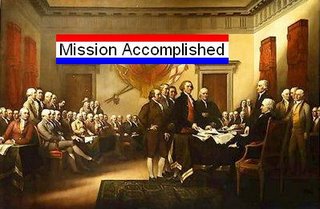Close enough for government work!Though the Fourth of July is almost iconic to Americans, some claim the date itself is somewhat arbitrary. New Englanders had been fighting Britain since April 1775. The first motion in the Continental Congress for independence was made on June 8. After hard debate, the Congress voted unanimously (12-0), but secretly, for independence from the Kingdom of Great Britain on July 2 (see Lee Resolution). The Congress reworked the text of the Declaration until a little after eleven o'clock, 4th of July, when thirteen colonies voted for adoption and released an unsigned copy to the printers. (New York abstained from both votes.) Philadelphia celebrated the Declaration with public readings and bonfires on July 8. Not until August 2 would a fair printing be signed by the members of the Congress, but even that was kept secret to protect the members from British reprisal.

Of course, the
"Democracy is messy."
-- Donald Rumsfeld, American statesman.

2 comments:
I am quite positive that you find it convenient to jokingly relabel a "patriot" as an "insurgent" is if to create some perverse parallel and justficiation between "terrorist" and "freedom fighter." Within the academic world, an insurgent is in fact known to engage in armed uprisings, revolts, or insurrections against an established civil or political authority, such as a constituted government or a military occupation by an invading force. Nevertheless, they typically engage in regular or guerrilla combat against the armed forces of the established regime, or conduct sabotage and harassment in the land.
Contrary to the argument that you seem to be making, while the Revolutionary War is often thought of as a "guerrilla war," guerrilla tactics were uncommon, and almost all of the battles involved conventional set-piece battles. According to historians, some of the confusion may be due to the fact that generals George Washington and Nathaniel Greene successfully used a strategy of harassment and progressively grinding down British forces instead of seeking a decisive battle, in a classic example of asymmetric warfare.
Nice try Mr. Plank. "Where's OBL?" Where's your Merriam-Webster dictionary and Encyclopedia Britanica?
The point is merely that, as Obi-Wan Kenobi once said, a great deal depends upon one's point of view. Certainly, the occupying British viewed the Boston Tea Party as an act of industrial sabotage, and regarded the Minutemen as a militia. I am not trying to "create" some parallel -- the parallel already exists, as your qualification-laden post demonstrates. How far one wishes to push the parallel is open to debate, but admitting that it exists does not imply a moral equivalence.
Post a Comment